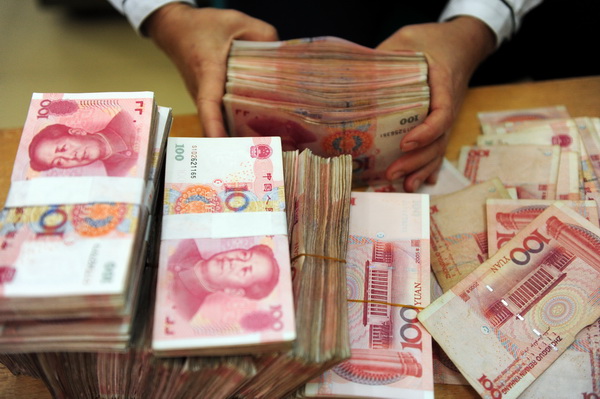Yuan cross-border settlement extended
Updated: 2012-03-03 09:22
By Gao Changxin (China Daily)
|
|||||||||||
Move part of strategy to promote internationalization of the currency
BEIJING - The People's Bank of China on Friday again expanded the yuan-denominated cross-border trade settlement scheme, in a move that will further promote the use of the Chinese currency in foreign trade and its rise as a global currency.
After the expansion, all enterprises with an import-and-export license will be allowed to settle their foreign trade in yuan. Previously, only selected businesses were allowed to do this.
 |
|
Yuan notes being counted at a bank in Qionghai, Hainan province. The Chinese central bank says all enterprises with an import-and-export license can settle their foreign trade in yuan if they so desire. Previously, only selected businesses were allowed to do this.?[Photo/China Daily] |
The move is designed to "meet market demand and make foreign trade freer and more convenient", the central bank said in a statement posted on its website.
Yuan-denominated trade settlement quickly ballooned after it was first launched in July 2009. By the end of 2011, the volume of trade settlement in the Chinese currency under the current account hit 2.58 trillion yuan ($410 billion), according to data from the central bank. HSBC Holdings Plc has forecast that one-third of China's cross-border trade may be settled in yuan by 2016.
Boosting the yuan's application in global trade is part of the country's wider ambition to let the currency stand alongside the dollar, euro and yen as a fully convertible reserve currency. In the longer term, the plan, if realized, could strengthen China's influence in the global financial markets and make it cheaper for the country to finance its debt.
As part of the plan, the country has also made efforts to make the currency more convertible under the capital account over the past year, including allowing foreign direct investment to be settled in yuan. Recently, qualified individuals in the city of Shenzhen won approval to make yuan-denominated cross-border transfers through designated banks with a daily cap of 80,000 yuan.
In the short term, settling China-related trade deals in yuan rather than US dollars could help the nation's importers and exporters reduce the risks posed by currency fluctuations. However, many exporters have complained that they are having difficulty finding counterparts that want to settle their trade in yuan.
"We are more than happy to settle our exports in yuan, but the problem is that our foreign clients have little intention of doing that," said Lou Fuan, general manager of Deli Group Co Ltd, a stationery manufacturer based in Ningbo, Zhejiang province. Lou's company has 2.1 billion yuan in assets and annual sales of around 2 billion yuan.
At present, most yuan-denominated trade settlement is conducted in the country's imports. Foreign enterprises are more willing to receive yuan than to use it for payment because the currency has been appreciating against the US dollar. For foreign enterprises to use the yuan more frequently, analysts say, efforts are needed to build developed financial markets that will support trading and investment in yuan.
"Few want to use a currency if they can't invest it and hedge the currency-fluctuation risks," said Wang Jianhui, chief economist with Southwest Securities Co Ltd.








